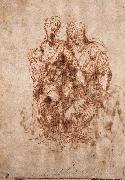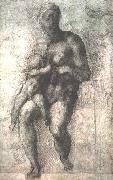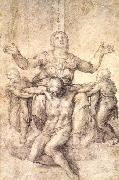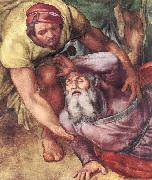Michelangelo Buonarroti Huiler la Reproduction de TableauAll Michelangelo Buonarroti Oil Paintingsb Caprese 1475 d Rome 1564 |
|||

|
|||
|
|
|||
|
||||||||||||
| Michelangelo Buonarroti b Caprese 1475 d Rome 1564 |
||||||||||||
|
|
||||||||||||
| ID de tableau:: 62878 St Anne with the Virgin and the Christ Child St Anne with the Virgin and the Christ Child 1505 Pen, 254 x 177 mm Ashmolean Museum, Oxford The challenge of this subject is the placement of one grown woman on the lap of another without creating an awkward appearance. Michelangelo dealt with a similar problem already in his Roman Piete a subject which required the placement of an adult male on the lap of a woman. Artist: MICHELANGELO Buonarroti Title: St Anne with the Virgin and the Christ Child Date: 1501-1550 Italian , graphics : religious 1505 Pen, 254 x 177 mm Ashmolean Museum, Oxford The challenge of this subject is the placement of one grown woman on the lap of another without creating an awkward appearance. Michelangelo dealt with a similar problem already in his Roman Piete a subject which required the placement of an adult male on the lap of a woman. Artist: MICHELANGELO Buonarroti Title: St Anne with the Virgin and the Christ Child Date: 1501-1550 Italian , graphics : religious |
||||||||||||
|
|
||||||||||||
| ID de tableau:: 62879 Study for a Madonna and Child Study for a Madonna and Child 1533 Black chalk on paper British Museum, London Artist: MICHELANGELO Buonarroti Title: Study for a Madonna and Child Date: 1501-1550 Italian , graphics : study 1533 Black chalk on paper British Museum, London Artist: MICHELANGELO Buonarroti Title: Study for a Madonna and Child Date: 1501-1550 Italian , graphics : study |
||||||||||||
|
|
||||||||||||
| ID de tableau:: 62880 Study for the Colonna Piet Study for the Colonna Piet 1538 Chalk Isabella Stewart Gardner Museum, Boston In 1538, three years before the completion of the Last Judgment, Michelangelo had met Vittoria Colonna. She belonged to the circle of Juan Valdes, who was striving towards an internal reform of the Catholic Church. To put it very simply, one can say that the main conviction of this theological trend was the idea of the utmost need of faith, as opposed to good deeds or sacraments, because, in the last resort, it is only divine grace which is all-powerful. These almost protestant beliefs could not conquer, or in any way change, Michelangelo because too much of his work would have had to be denied. However, they must have to some extent disrupted his firm belief, as he had expressed it in his works, that by creating perfect physical beauty he had represented the essence of the supernatural and of the divine. It is true, however, that he felt the need for divine grace, and, from this point onwards, this had great bearing on his creative life. We find evidence of this in a drawing of the Piete made for Vittoria Colonna. When compared with the 1499 Piete we see clearly that the main objective is the thought of the Compassionate Christ and of the Redemption through Christ's Blood. The work turns openly towards the onlooker to admonish him, drawing his attention to the sacrifice of Golgotha. Artist: MICHELANGELO Buonarroti Title: Study for the Colonna Piete Date: 1501-1550 Italian , graphics : study 1538 Chalk Isabella Stewart Gardner Museum, Boston In 1538, three years before the completion of the Last Judgment, Michelangelo had met Vittoria Colonna. She belonged to the circle of Juan Valdes, who was striving towards an internal reform of the Catholic Church. To put it very simply, one can say that the main conviction of this theological trend was the idea of the utmost need of faith, as opposed to good deeds or sacraments, because, in the last resort, it is only divine grace which is all-powerful. These almost protestant beliefs could not conquer, or in any way change, Michelangelo because too much of his work would have had to be denied. However, they must have to some extent disrupted his firm belief, as he had expressed it in his works, that by creating perfect physical beauty he had represented the essence of the supernatural and of the divine. It is true, however, that he felt the need for divine grace, and, from this point onwards, this had great bearing on his creative life. We find evidence of this in a drawing of the Piete made for Vittoria Colonna. When compared with the 1499 Piete we see clearly that the main objective is the thought of the Compassionate Christ and of the Redemption through Christ's Blood. The work turns openly towards the onlooker to admonish him, drawing his attention to the sacrifice of Golgotha. Artist: MICHELANGELO Buonarroti Title: Study for the Colonna Piete Date: 1501-1550 Italian , graphics : study |
||||||||||||
|
|
||||||||||||
| ID de tableau:: 62881 The Conversion of Saul The Conversion of Saul 1542-45 Fresco, width of detail 114 cm Cappella Paolina, Palazzi Pontifici, Vatican The detail shows soldiers on the left side of the fresco. Artist: MICHELANGELO Buonarroti Title: The Conversion of Saul (detail) Date: 1501-1550 Italian , painting : religious 1542-45 Fresco, width of detail 114 cm Cappella Paolina, Palazzi Pontifici, Vatican The detail shows soldiers on the left side of the fresco. Artist: MICHELANGELO Buonarroti Title: The Conversion of Saul (detail) Date: 1501-1550 Italian , painting : religious |
||||||||||||
|
|
||||||||||||
| ID de tableau:: 62882 The Conversion of Saul The Conversion of Saul 1542-45 Fresco, width of detail 101 cm Cappella Paolina, Palazzi Pontifici, Vatican The detail shows St Paul and a soldier. Artist: MICHELANGELO Buonarroti Title: The Conversion of Saul (detail) Date: 1501-1550 Italian , painting : religious 1542-45 Fresco, width of detail 101 cm Cappella Paolina, Palazzi Pontifici, Vatican The detail shows St Paul and a soldier. Artist: MICHELANGELO Buonarroti Title: The Conversion of Saul (detail) Date: 1501-1550 Italian , painting : religious |
||||||||||||
|
|
||||||||||||
| Artiste précédent Artiste prochain | ||||||||||||
|
|
||||||||||||
|
Michelangelo Buonarroti b Caprese 1475 d Rome 1564 |
||||||||||||
|
|
||||||||||||
|
CONTACTER DES Etats-Unis |










